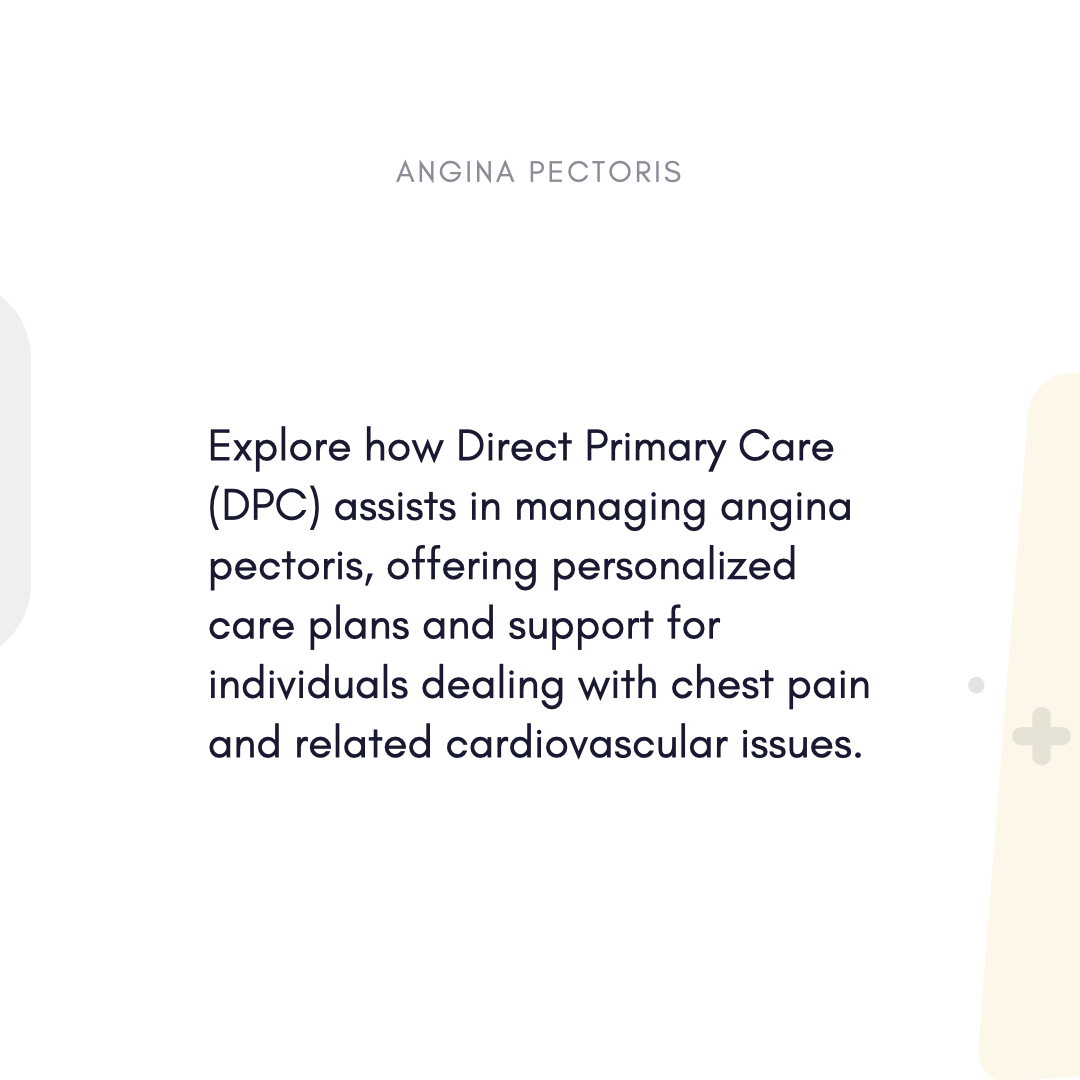As a consequence of reduced blood flow to the heart muscle, angina pectoris, or angina, is a symptom of coronary artery disease (CAD). Angina can be managed by relieving symptoms, reducing complications, and improving overall heart health. Patients can benefit from Direct Primary Care (DPC) by receiving personalized care, lifestyle guidance, and ongoing support for managing angina and improving their quality of life.

Understanding Angina Pectoris
A narrowed or blocked coronary artery causes angina, which occurs when the heart muscle does not receive enough oxygen-rich blood. As a result of plaque buildup in the arteries (atherosclerosis), it restricts blood flow to the heart. The symptoms of angina include chest pain, pressure, and discomfort, often described as a feeling of squeezing or tightness. Aside from pain or discomfort in the arms, shoulders, neck, jaw, or back, shortness of breath, nausea, fatigue, or dizziness may also occur.
The Benefits of DPC for Angina Pectoris Patients
- Angina Comprehensive Evaluation: DPC providers provide comprehensive evaluations to determine the severity and frequency of angina symptoms, identify underlying risk factors, and determine the appropriate treatment course. It may involve reviewing the individual's medical history, conducting a physical examination, conducting diagnostic tests such as electrocardiography (ECG), stress testing, and coronary angiography, as well as assessing lifestyle factors that may contribute to angina.
- The development of individualized treatment plans tailored to each patient's unique needs and preferences is one of the key benefits of DPC for angina patients. Angina symptoms can be managed, cardiovascular risk factors reduced, and heart health improved through the development of personalized strategies by DPC providers. Symptoms may be controlled and complications prevented by lifestyle modifications, such as dietary changes, regular exercise, smoking cessation, stress management techniques, and medication management.
- Managing angina requires ongoing monitoring and support to prevent disease progression and ensure optimal symptom control. In order to help individuals manage their condition effectively, DPC providers offer regular follow-up appointments to monitor their progress, adjust treatment plans if necessary, and provide ongoing education and support. Continuity of care keeps individuals motivated, informed, and engaged.
Personalized Angina Pectoris Management in DPC
- A DPC provider emphasizes the importance of lifestyle modification in managing angina and improving heart health. The program may include tips on adopting a heart-healthy diet low in saturated fats, cholesterol, and sodium, increasing physical activity, maintaining a healthy weight, managing stress, and avoiding tobacco use. Individuals can improve their cardiovascular health and reduce their risk of angina episodes by changing their lifestyles.
- It is essential to manage angina symptoms and reduce the risk of complications with medications. To control symptoms, prevent chest pain episodes, and improve blood flow to the heart muscle, DPC providers prescribe and monitor medications such as nitroglycerin, beta-blockers, calcium channel blockers, and antiplatelet agents. Furthermore, they educate patients on the proper use of medications, possible side effects, and the importance of adherence to medication.
- Identifying and addressing modifiable risk factors for coronary artery disease and angina, including hypertension, high cholesterol, diabetes, obesity, and sedentary lifestyle, are among the services provided by DPC providers. It is possible to reduce the risk of angina episodes, heart attacks, and other cardiovascular events by addressing these risk factors through lifestyle modification, medication management, and regular monitoring.

The Direct Primary Care program offers individuals living with angina pectoris valuable support and resources. DPC enables individuals to effectively manage their condition, improve their heart health, and enhance their quality of life by providing personalized care, comprehensive evaluation, and ongoing support. Taking control of angina symptoms, reducing cardiovascular risk, and living a healthier, more fulfilling life are all possible with the guidance and support of DPC providers.





